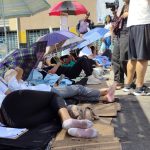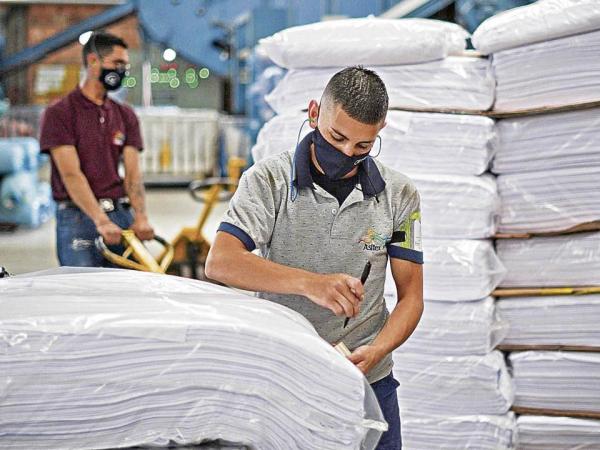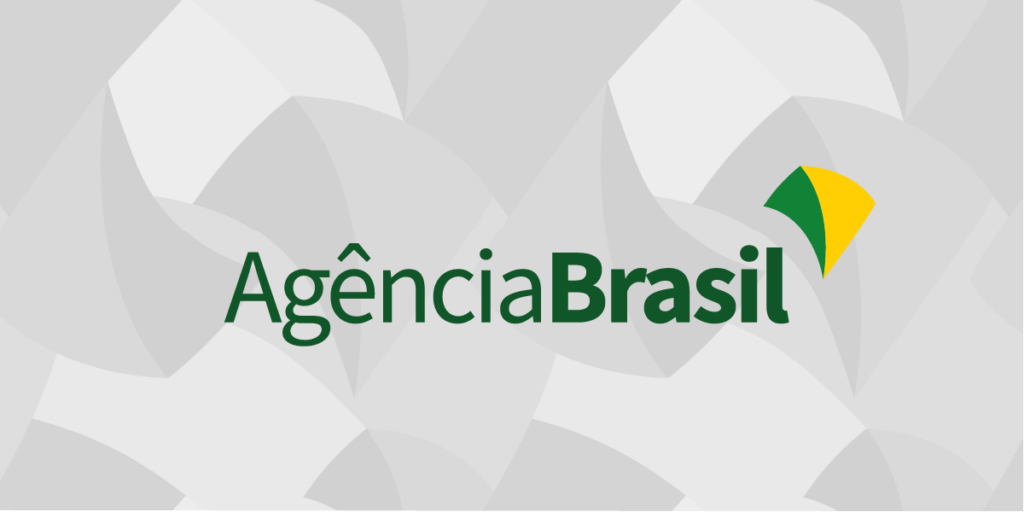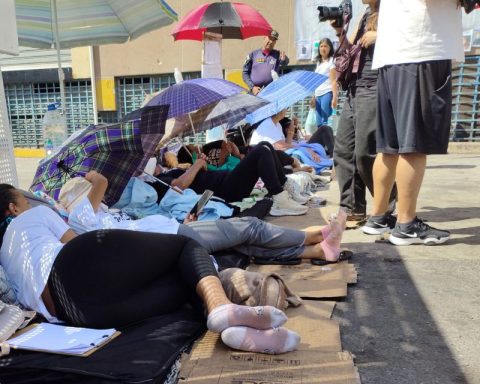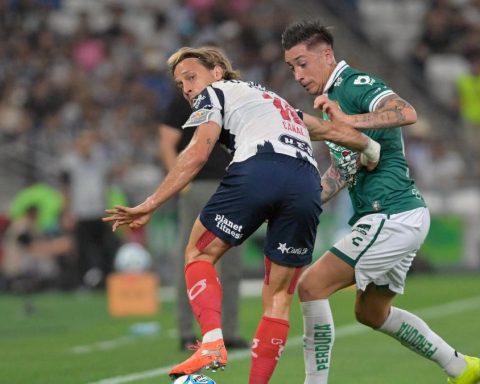Neftali Carabantes, former undersecretary of the Carabineros in the first government of President Michelle Bachelet, analyzes in detail in this interview the Law on Rules for the Use of Force that the government presented in Congress last Monday. The lawyer points out that “today it is more necessary than ever to have these legal norms of the Rules for the Use of Force because force has had to be used more frequently, because there is less respect and collaboration with the police and this It must be properly regulated.”
Current Secretary General of the Central University, Neftali Carabantes is optimistic regarding the security discussion and calls attention to the need to reach agreements, “I am sure that with more dialogue and fewer attacks we would be able to move faster and reach a better security agenda “. Carabantes highlights the work of the current Minister of the Interior, pointing out: “Carolina Toha is a state woman and her strengths make her shine with her own light: indefatigable, simple. Persevering and capable,” she highlights.

Former undersecretary of Carabineros, Neftali Carabantes.
-Why are the Rules for the Use of Force (RUF) necessary?
-It is necessary to point out that Carabineros de Chile is legally authorized to use various means of force in the performance of their duty. Now, this power carries with it obligations, particularly respect for human rights that may be affected by the exercise of it and that the State and its police agents are obliged to respect and protect.
The bill sent by the Executive responds to a debt that our country has both in terms of Human Rights, on the one hand, and protection of the proper exercise of police functions, on the other. Indeed, this bill contemplates clear and fair rules to protect the proper exercise of police functions. With this, not only is the necessary protection provided to the personnel of the Public Order and Security Forces in the performance of their duty, but it is also the most appropriate way to give greater effectiveness to the police function.
-What is the importance of this regulation having a legal status?
-The jurisprudence of the Inter-American Court of Human Rights has repeatedly ruled that the lack of adequate legislation on the use of force constitutes a breach of the obligation to guarantee the rights to life and integrity, which compromises the international responsibility of the State of Chile. For this reason, it is essential that these norms, which today are regulated at the hierarchical level by circulars from the Ministry of the Interior, are raised to the rank of law, since they are also norms that must strictly adhere to international standards.
Consequently, the regulation that the Government is promoting is good for the Carabineros and it is a wish that I am sure will be widely supported by the parliamentarians that make up the government coalition and also from the opposition.
-There are sectors of the opposition that oppose the approval of the RUF, what is your opinion?
-It should be remembered that this initiative was promoted by the signing of a Protocol of Agreement during the processing in the Mixed Commission of the Constitutional Reform for the protection of critical infrastructure, today Law No. 21,542. In addition, this matter was an integral part of the transversal agreement for security, therefore, no political sector can claim ignorance.
respect for the law
-Is it a contribution to the work of the Carabineros?
-Of course. The Rules for the Use of Force are the mirror and the framework where Carabineros must look and adjust their actions in democracy. It is not that the Carabineros do not have Rules for the Use of Force in force, what happens is that the project sent, in my opinion, updates them, improves them, strengthens the regulatory framework, and elevates them to the rank of law. I am convinced that the only good police work is the one that is carried out within the respect of the law.
-What is the role of the Carabineros High Command?
-In light of what happened in the social outbreak, this new regulation represents a challenge for the institutional high command, for its corporate governance, since the supervision and control functions of the command are fundamental, strategic and necessary to ensure that the orders and procedures are followed, and certainly to take the necessary measures when the opposite happens. In addition, the high command must order the strengthening of the planning and the retraining of the police officers in the street. The police officer who graduates must have sufficient skills, especially in the techniques for the use of force, personal defense, use of firearms, control of public order, control of vehicles and standard procedures.
In addition, today it is more necessary than ever to have these legal norms of the Rules for the Use of Force because force has had to be used more frequently, because there is less respect and collaboration with the police and this must be duly regulated.
– But Carabineros has been rising in the polls and even occupies the first places of citizen approval?
-That is fantastic. Carabineros is a republican and permanent institution of the Republic. We all want to make meat so that wherever the Carabineros are, there will be order and there will be a Homeland. However, I observe with concern that the Carabineros adopt a complacent look due to its rise in the latest polls, if this is not accompanied by a real attitude of cooperation from the community towards its management. Let me explain, that apparent legitimacy or social license indicated by the surveys, is not consistent with the real attitude of the people towards the Carabineros, that is, there are no high degrees of cooperation from important sectors of the citizenry towards police action. There is much to improve in confidence, and progress in the work in its role as community preventive police.
-The Draft Law on the Rules for the Use of Force contemplates issuing regulations that contain protocols and technical details, which may be reviewed by police institutions, what is your opinion?
-Perhaps this is the only point of the project – which I reiterate, I value very much – that at first glance does not provide the clarity that would have been desired, since it leaves too wide a space for the regulatory power derived from first grade. This is a very technical issue, but roughly speaking, a Regulation, even if it comes by derivation from Congress, once again has the same problem of creating a rule and not a penal norm. This is a first and key legislative challenge, since the core of a punishable conduct must always be in the law and not in a regulation.
A second challenge is related to making the Nain-Retamal Law converse with the Rules of the Use of Force, but the latter, hopefully with the force of law, that is, not leaving everything at the regulatory level as it is proposed in the bill sent by the government. Hence, my suggestion is to try to advance in a law of Rules for the Use of Force, and not so much in a Regulation at this stage, precisely so that the Carabineros official has total clarity that this regulation will be applied on the day of tomorrow and the only way to ensure that is for a criminal law to come into force and not just a regulation. I reiterate this must be the product of agreements and concessions from all political sectors, and within the framework of a very fine, very serious, very technical legislative debate in Congress regarding the Rules for the Use of Force, without a doubt of much richness and technical quality, to specify them and limit the scope of action of the Regulation, because at the end of the day a Regulation cannot found a law, it is the other way around, the law must found the Regulation.
– Do you share the demands that are made to President Boric to apologize for his position on security matters in the past?
-The President has made a noble call for reflection and self-examination. For its part, the progressive world has acted responsibly and maturely on security issues and bills. I think thats enough. For the rest, for progressivism, security is consubstantial to democracy, and it does not have to give any proof of whiteness. I observe a lot of nonsense and a propensity for political tripping in a matter like security, which should have been a State policy a long time ago. It would reduce the number of dissonant statements from certain parliamentarians who are real bullets that hit the soul of politics. I am sure that with more dialogue and fewer attacks we would be able to move faster and achieve a better security agenda.
Has President Boric poured complex expressions in the past?
-I have always considered that you get to know the essence of a person, not so much by their words, but by their behavior, sometimes we say things, but we end up doing others, a product that rationality imposes. Having said that, the conduct, the praxis of President Boric in the governmental exercise has been responsible in matters of security and Carabineros.
-As?
-The actions are in sight and an action is worth a thousand words. His government has set its sights on fighting crime and drug trafficking and what progress has been made at the regulatory and institutional level is in sight.
A piece of information for analysis, when this government ends, history will say that the most important protected legal asset of the legal system in Chile will be the life of a Carabinero. Indeed, whoever threatens his life or integrity will receive the highest penalties in the industry code, even harsher than those assigned to a serial rapist, a pedophile, a serial murderer or a rapist. human rights.
What is your opinion on the Valencia Criterion regarding preventive detention for undocumented immigrants?
-It is a well-inspired measure, but it is only an internal guideline of the Prosecutor’s Office that does not enjoy objective legal protection, which is why the application of preventive detention may not be as effective as one would like. In addition, because it is a guideline that is interconnected with the response that other public services can offer such as the Civil Registry and Gendarmerie, entities whose response capacity -in the times that the Valencia measure requires- is in question. Therefore, I reiterate, the effectiveness of the measure will be at the mercy of what each judge of the Republic decides in a specific case, and must be evaluated on a case-by-case basis, in light of the intersection of various antecedents and legal requirements at the time of resolving the application of pretrial detention.
Now, the National Prosecutor has every right to establish guidelines that unify the actions of the Public Ministry, that is legitimate, and must be respected, as well as the rights of a huge number of migrants who work hard and are a contribution to the country.
Let’s talk about politics…
-But we have spoken 100% of pure politics in matters of security (smiles).
-You know the Minister of the Interior Carolina Tohá, you worked with her when she was undersecretary and she was minister, both in the Ministry of the General Secretariat of Government during the administration of Michelle Bachelet. What is your evaluation of Minister Tohá?
– Minister Toha has had perhaps the most complex, adverse and harsh stage of public security, both due to the crude criminal moment that the country is going through, and due to the dense political tension and, wow, that she has lived up to it. She has approved more important security laws than all post-dictatorship Interior Ministers, and in recent days she has managed to add an unprecedented US$1.5 billion to the security budget focused on strengthening our police forces. If this isn’t leadership in the form of chief of staff, I don’t know what we’re talking about. Carolina Toha is a state woman and her strengths make her shine with her own light: indefatigable, simple. persevering and capable
-Do you agree with those who point out that for Democratic Socialism and I Approve Dignity the electoral horizon looks black?
-I have been able to verify that genuine leadership always emerges from a cabinet. I am convinced that pessimism cannot colonize progressivism; What’s more, sometimes I find myself laughing and surprised when some point out that the government coalition has no future. Please! Tohá, Uriarte, Jara and Vallejo, that’s where the path loaded with the future comes from.








